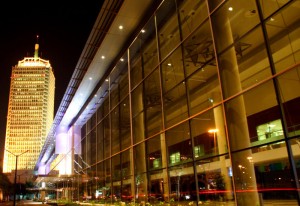Source: www.ameinfo.com
With the world’s tallest building, Burj Dubai, set to be unveiled later this year, one could be forgiven for thinking that big is always better in Dubai.
 However a recent report by Standard Chartered Bank suggests that it is the small businesses and entrepreneurs operating within Dubai that are the key to the region’s economic growth by driving employment, ensuring the successful diversification of the economy away from oil and other hydrocarbons and helping these new markets to become more competitive on the international stage.
However a recent report by Standard Chartered Bank suggests that it is the small businesses and entrepreneurs operating within Dubai that are the key to the region’s economic growth by driving employment, ensuring the successful diversification of the economy away from oil and other hydrocarbons and helping these new markets to become more competitive on the international stage.
A second dossier on the Middle East’s economic development reinforces the importance of SMEs to Dubai’s future. In the report, Mohammed Shael, CEO of Business Registration in Dubai, comments that “98% of businesses registered in Dubai are either micro, or small or medium enterprises (SMEs). We believe they are the fuel of our economy and we need to look after them [and] encourage them.”
The Government of Dubai is committed to promoting the benefits to companies looking to establish a presence in the Middle East both locally, via the Department of Economic Development, and internationally via its Dubai Tourism and Commerce Marketing (DTCM) representative offices.
Already recognised internationally as a global hub for business, offering unparalleled support and world-class facilities to the broad spectrum of businesses based there, Dubai has acted to ensure investor needs are met irrespective of the current economic climate to ensure its commercial offering remains compelling.
In 2009, 45% of the Government of Dubai’s budget was invested in the emirate’s infrastructure, with Dubai Metro already launched and Al Maktoum International Airport (the world’s largest) opening in phases from next year. This is set to transform trade – particularly the re-export market – with items able to be transported from port (Jebel Ali, the world’s largest man-made port) to plane in just two hours and ensure that Dubai builds on its position as the world’s third largest re-export hub.
Similarly over 30 free zones in Dubai offer unique benefits to businesses locating there. These sector-specific clusters are treated as ‘offshore’, allowing for myriads of benefits to be offered to businesses located there, including 100% foreign ownership, 100% repatriation of capital, and profit and no corporate taxes.
The concept of ‘convenience’ – with every facility under one umbrella – also allows for more efficient and cost-effective distribution.
The UK and Ireland representative office of the DTCM promotes the emirate via seminars hosted across the UK and Ireland which showcase the benefits of doing business in Dubai. These are often illustrated through case studies of UK and Irish SMEs who have successfully moved their operations into the Middle East such as strategic marketing agency Native, which has had a presence in Dubai since 2007.
Native was so impressed by its experiences locating in the emirate, that it created the Middle East Business Club, designed to encourage other businesses to invest in the region by working with Chambers of Commerce to help with market research, market entry and marketing plans.
Ian Scott, Director UK and Ireland for DTCM, said:
“That we have seen such sustained investment in infrastructure and support, even during the global economic downturn, reflects Dubai’s commitment to constantly evolve its commercial offering to businesses. There are 1850 different business activities registered in Dubai and it is this diversity which makes it such an effective place for companies to invest. At a time when SMEs and entrepreneurs need to maximise any opportunity to grow their business, we feel that Dubai is perfectly placed to support them with a robust infrastructure and strategic geographic location at the gateway between East and West.”
















